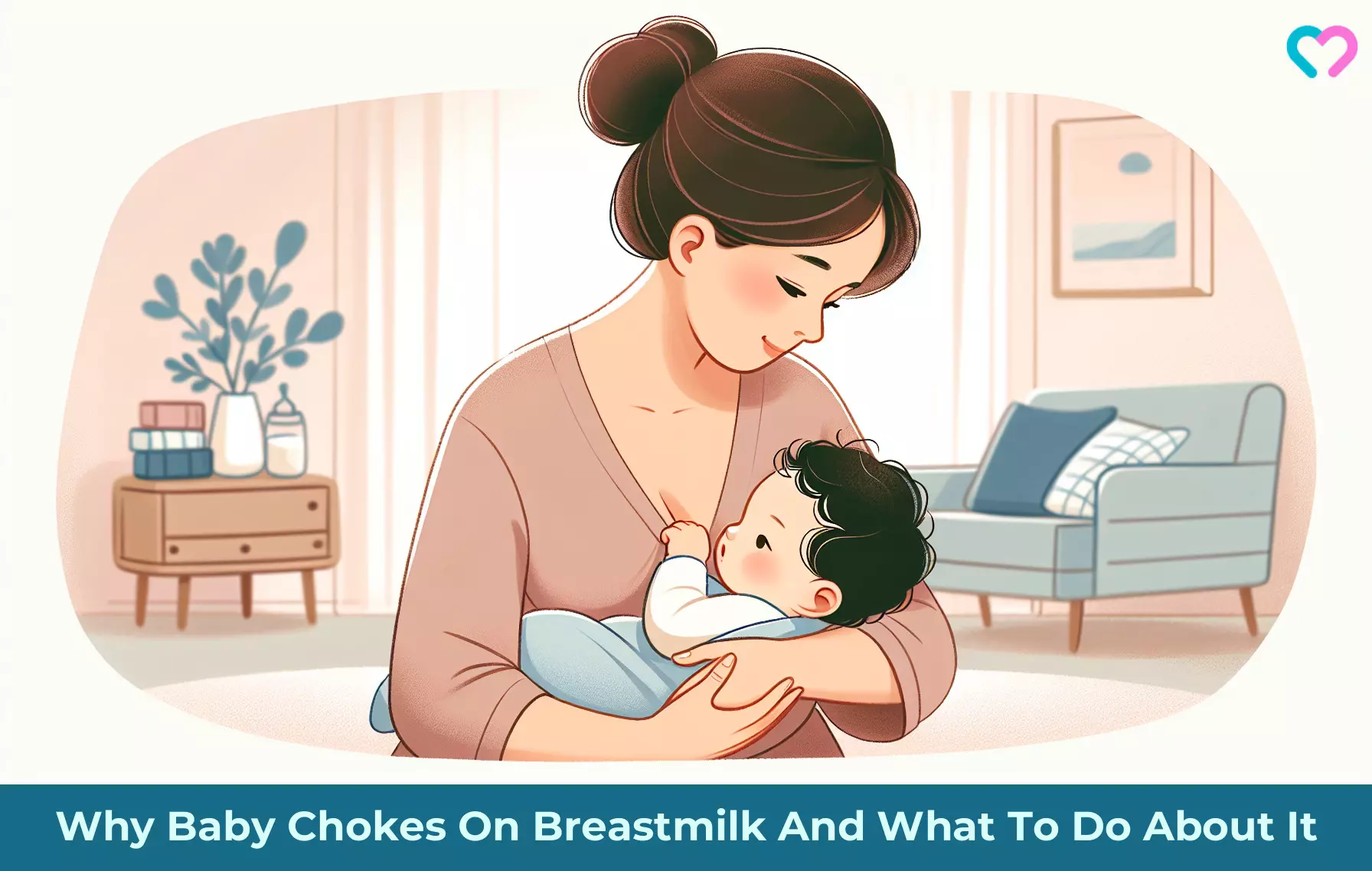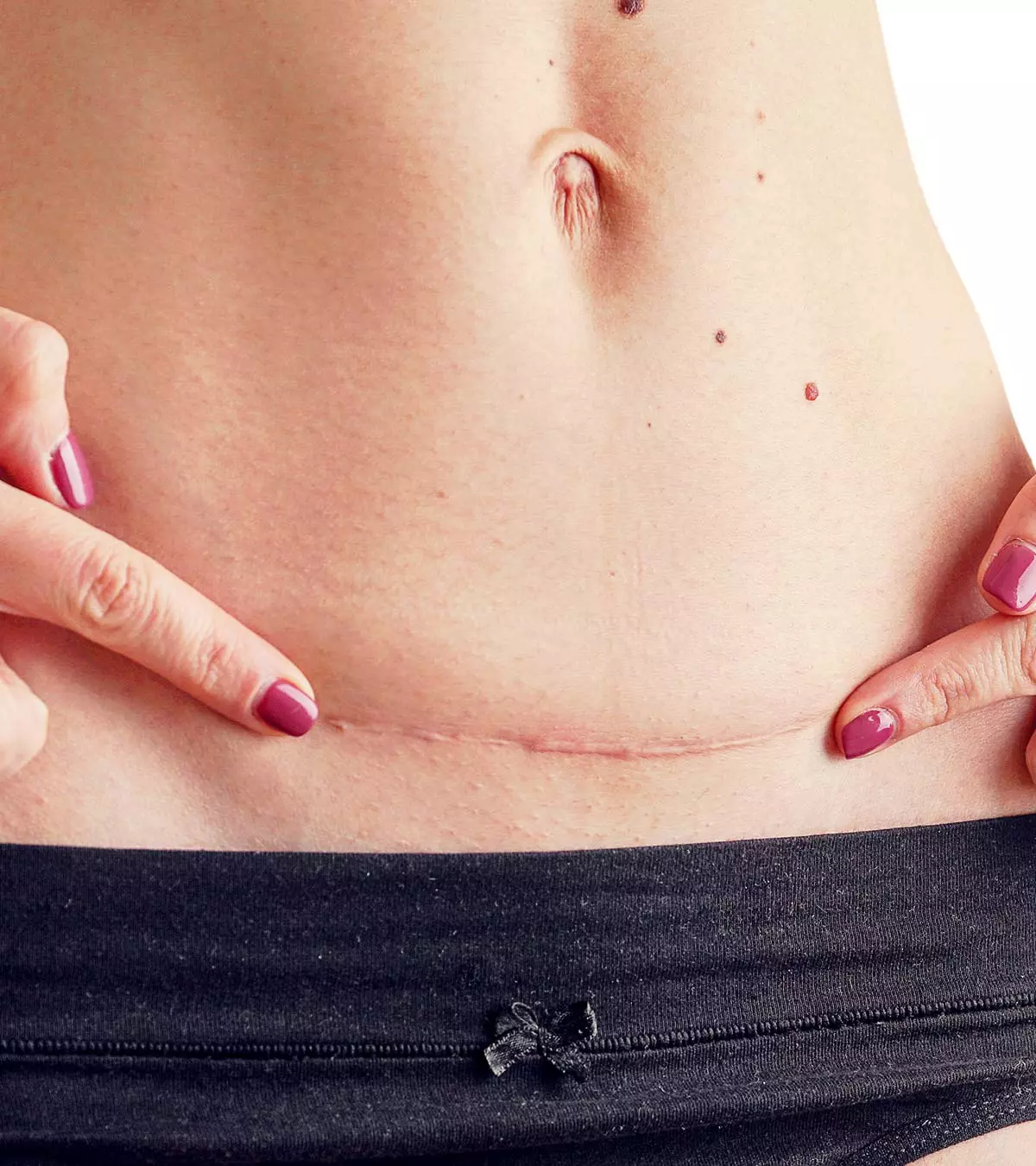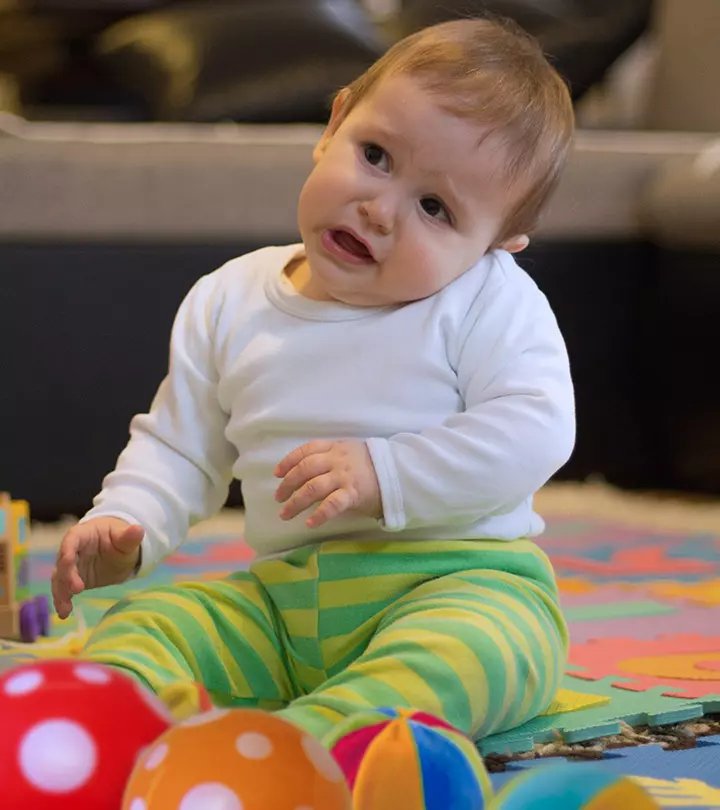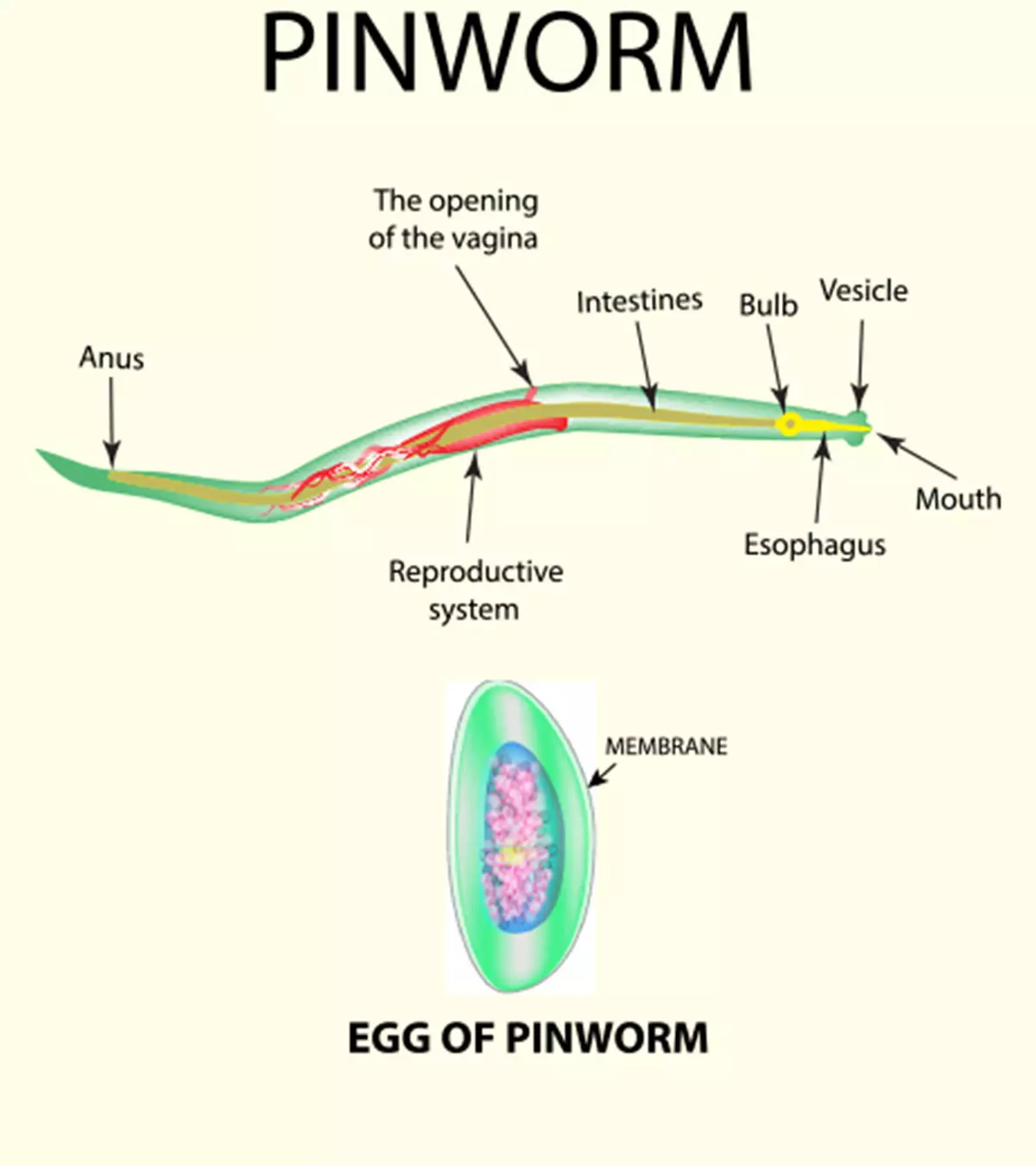
Image: Shutterstock
If you see your baby choking on breastmilk, it could be because their swallowing skills aren’t fully developed. Choking when breastfeeding can result in innocuousiNot harmful to one's physical or mental health. coughing. Further, milk can sometimes make its way into the lungs, causing aspiration pneumonia (1). If your baby has rapid breathing, turns blue, or becomes unconscious from choking on breast milk, get emergency medical attention. If your baby has experienced many choking incidents, you might want to see a pediatrician. Read on to learn more about the reasons for choking in babies, preventive measures, and what to do if you find yourself in this scenario.
Key Pointers
- Feeding difficulties, oversupply, and overactive letdown can cause the babies to choke on breastmilk.
- It is recommended to stop feeding and keep the baby in an upright position immediately when they choke while feeding.
- You may change feeding position, manage oversupply, or express milk before feeding to reduce choking while nursing.
Why Does A Baby Choke While Breastfeeding?
A baby can choke on breastmilk due to various reasons, ranging from normal immature swallowing to feeding problems due to anatomicaliOf or about the body structures or anatomy. or functional disorders. It can also be due to maternal factors. The main causes of choking while breastfeeding can be (2):
- Oversupply of breast milk: Faster milk flow is one of the major causes of choking on breast milk. Infants may not be able to swallow quickly. This may often happen if the mother has an oversupply of breast milk. The baby may bite while breastfeeding due to the overflow of milk, thus making swallowing further difficult.
- Overactive letdown: It is the forceful ejection of milk when your baby is sucking. Let down reflex is controlled by oxytociniA naturally occurring hormone that controls the male and female reproductive systems and impacts labor, childbirth, and lactation. hormones. Increased release of breast milk can cause gulping, coughing, or choking in infants.
Dr. Joanna E. Perdomo, a board-certified pediatrician from Nicklaus Children’s Hospital in Miami, Florida, says, “Babies may choke or cough when breastfeeding. This usually happens near the beginning of a feed when the milk letdown may be too strong or forceful for the baby to handle.”

Infants who have feeding difficulties are associated with a high risk of choking while breastfeeding or bottle-feeding. The following congenitaliA condition or trait that is present at birth. abnormalities may result in feeding problems (3).
- Developmental delay
- Neurological issues such as cerebral palsyiA combination of disorders that affects the muscle tone and impairs one's ability to move, balance, and maintain a healthy posture
- Down’s syndrome
- Structural anomalies of oral, respiratory, or feeding structures, such as cleft lip and palate and Pierre Robin syndrome
- Gastrointestinal issues, such as tracheoesophageal fistula
- Congenital heart diseases
- Lung and liver diseases
A healthcare provider should examine if there is frequent choking while feeding. Early intervention could reduce the risk of aspiration pneumonia and other complications.
 Be watchful
Be watchfulWhat To Do If A Baby Chokes While Breastfeeding?
Take the baby off the nipple instantly and position them upright if you notice them gagging or choking during feeding. This action aids in clearing their airway. Stay calm and seek medical attention if they are frequently coughing or gagging. Don’t worry. It may take some time for your infant to become comfortable with suckling.
Gagging and choking during nursing is common in young babies. Understanding and managing baby gagging can help parents respond appropriately and ensure a safer feeding experience. Most of the time, babies can protect themselves from breast milk aspiration due to hyper-gag reflex.
The following first aid can be done if your baby chokes while nursing (4).
- Stop feeding if the baby chokes on milk.
- Hold the baby in an upright position for a few seconds. This could help babies to manage the problem.
- Provide good head and neck support while holding younger infants in an upright position.
- Patting the baby’s back may help them.

Dr. Emeka Obidi, a pediatrician and father of three from Western Maryland, shares his insights on babies choking during feeding, “Babies tend to learn over time how to modulate how hard they suck, so they don’t suck too hard, causing more milk to come out than they can handle. Often, this is a problem that doesn’t last long; it tends to get better as the baby gets older. However, it is important for every parent to learn how to perform CPR so that, in the event your baby is having trouble breathing, you are able to perform CPR and certainly call for emergency services to get help (i).”
When To Seek Medical Help
Mild choking can often be managed during breastfeeding, but it can be dangerous if the airway stays blocked for long. It’s important to recognize choking signs in babies to get timely medical help. Seek immediate care if you notice any of these symptoms in your baby (5):
- Difficulty crying or making sounds
- Trouble breathing
- Noisy breathing
- Weak or absent coughing
- Gagging
- High-pitched sounds while inhaling
- Changes in skin or face color
- Irritability or distress
If the baby turns blue or becomes unconscious after choking, emergency response is necessary. You should also contact a pediatrician if choking occurs in bottle-fed infants to ensure proper infant safety.
 Quick tip
Quick tipHow To Prevent Choking While Breastfeeding?
Dr. Perdomo recommends, “If choking happens during breastfeeding, remove the baby from the breast and allow the forceful letdown to pass before putting them back. If choking happens frequently, moms may try to hand express or use a manual breast pump to express the first part of their milk during the feed, and then put the baby to the breast once the flow slows down.”
The following remedies may help reduce or prevent the incidence of choking on breast milk (1) (2).
- Changing the feeding position is the best way to prevent choking while nursing. The laid-back feeding position is recommended for mothers who have an overactive letdown. This may help slow down milk flow due to gravity, and the baby could manage the flow better.
- Experts at the US Office on Women’s Health (OWH) suggest gently squeezing the nipple between your first and middle fingers or using your hand to apply light pressure to regulate excessive milk letdown (6). You may try to take the baby off the breast for a few minutes during the initial letdown after sucking.
- Lying on the side may also reduce choking incidents. This position may allow the baby to let go of the breast and let the milk flow outside their mouth to avert choking.
- You may also express milk a few minutes before feeding to reduce overflow and help to control let down.
- To manage overflow, you could also try block feeding, which involves nursing the baby on one breast for a set duration.

- It is recommended to seek help from international board-certified lactation consultants (IBCLC) to manage overflow and hyperactive letdown issues. A pediatrician may also help to choose the right bottles and positions to prevent choking while formula feeding.
Note: You should be cautious while expressing or pumping milk since doing it for a longer duration may worsen the outcome. Consult a board-certified lactation consultant who can teach you the correct way to express or pump breast milk.
 Quick tip
Quick tipFrequently Asked Questions
1. Can babies choke on milk while sleeping on their backs?
No, the common belief that babies may choke while sleeping on their backs is false. Your baby’s gag reflex and airway anatomy prevent them from choking and enable them to sleep comfortably (7).
2. Can reflux cause babies to choke?
Yes, since some food and stomach acid travel back to the food pipe during reflux, it may cause babies to choke. However, the condition does not cause any worry as long as your baby is healthy. Further, sleeping on the back may help babies with reflux (7) (8).
3. Can a baby stop breathing from choking on milk?
Yes, if a baby’s airway becomes completely blocked due to choking on milk or any other object, it may lead to a loss of breath (5). Taking immediate action to clear the airway and restore normal breathing is crucial.
4. Can overfeeding cause choking?
While overfeeding a baby can lead to discomfort or regurgitation, it is less likely to cause choking directly (11). Choking usually occurs when a large volume of liquid or an object obstructs the baby’s airway.
5. What is the difference between choking and gagging in babies during breastfeeding?
Gagging is a normal reflex that occurs as the baby transitions to chewing and swallowing solid foods. Loud sounds and, in some cases, skin redness characterize it. On the other hand, choking is a silent process. If a baby with lighter skin is choking, their skin may turn blue (12).
6. Can a baby choke on breast milk while using a bottle?
A baby can also choke on breast milk while using a bottle or pacifier if the flow is too fast or there is too much milk in their mouth. According to the American Academy of Pediatrics (AAP), feeding babies when lying on their backs may increase the risk of choking and middle ear infections. To prevent this, use a slower nipple, take short feeding breaks, and avoid laying the baby flat during feeding. Instead, feed the baby in a near-sitting position with a slightly tilted bottle (13) (14). Choose a nipple recommended for your baby’s age.
If you have breastfeeding concerns and are worried about your infant choking on breastmilk, you must understand that the feeding skills of babies improve as they grow older. It is improbable for older babies to choke while nursing as they should be well acquainted with the procedure by now. However, if your little one lacks the age-appropriate ability to suck and swallow milk efficiently, they may be facing feeding difficulties. In such situations, you must consult your baby’s pediatrician to understand ways to avoid this problem and evaluate how to manage the situation.
Infographic: Baby Choking: Signs Your Baby Needs Help
Choking often occurs if your nursing infant swallows more milk at once. However, knowing the abnormal signs and when to take medical assistance can help prevent complications. Read through the infographic below to learn the signs you need to get your baby evaluated for choking. Illustration: Momjunction Design Team
Illustration: Why Baby Chokes On Breastmilk And What To Do About It

Image: Dall·E/MomJunction Design Team
Personal Experience: Source
MomJunction articles include first-hand experiences to provide you with better insights through real-life narratives. Here are the sources of personal accounts referenced in this article.
i. Does your baby choke while breastfeeding?https://www.youtube.com/watch?v=ji3Ds1G4XnA
References
- Aspiration pneumonia; U.S. National Library of Medicine
- Oversupply; La Leche League International (LLLI)
- Choking On Milk; My Health; The Government of Malaysia
- Infant choking while breastfeeding; New Kids-center
- Choking – infant under 1 year; Medline Plus
- Common breastfeeding challenges; Office on Women’s Health; U.S. Department of Health and Human Services
- How to Keep Your Sleeping Baby Safe: AAP Policy Explained; Healthy children; AAP
- Breastfeeding challenges; NHS
- Why Do Babies Choke On Mucus?; Children’s National
- Paced Bottle Feeding; Mater Mother’s Hospital
- Overfeeding a Baby; St. Luke’s
- Safe weaning; NHS
- Bottle-feeding problems and solutions; Institut national de santé publique du Québec
- Bottle Feeding Basics; American Academy of Pediatrics
Community Experiences
Join the conversation and become a part of our nurturing community! Share your stories, experiences, and insights to connect with fellow parents.
Read full bio of Rebecca Koyf
- Dr. Joanna E. Perdomo is a pediatrician working at Nicklaus Children’s Pediatric Care Centers. She earned her medical degree from the University of Chicago Pritzker School of Medicine and completed the Boston Combined Residency Program in Pediatrics. She also earned a master of public health from the Harvard T.H. Chan School of Public Health.
 Dr. Joanna E. Perdomo is a pediatrician working at Nicklaus Children’s Pediatric Care Centers. She earned her medical degree from the University of Chicago Pritzker School of Medicine and completed the Boston Combined Residency Program in Pediatrics. She also earned a master of public health from the Harvard T.H. Chan School of Public Health.
Dr. Joanna E. Perdomo is a pediatrician working at Nicklaus Children’s Pediatric Care Centers. She earned her medical degree from the University of Chicago Pritzker School of Medicine and completed the Boston Combined Residency Program in Pediatrics. She also earned a master of public health from the Harvard T.H. Chan School of Public Health.
Read full bio of Dr Bisny T. Joseph
Read full bio of Rohit Garoo
Read full bio of Anindita Ghatak




















